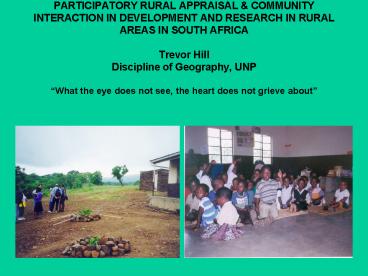PARTICIPATORY RURAL APPRAISAL - PowerPoint PPT Presentation
1 / 17
Title:
PARTICIPATORY RURAL APPRAISAL
Description:
'What the eye does not see, the heart does not grieve about' Outline ... What is perceived depends ... as the ignored hinterland. Case Studies: Ingwavuma, Kwa ... – PowerPoint PPT presentation
Number of Views:2395
Avg rating:3.0/5.0
Title: PARTICIPATORY RURAL APPRAISAL
1
PARTICIPATORY RURAL APPRAISAL COMMUNITY
INTERACTION IN DEVELOPMENT AND RESEARCH IN RURAL
AREAS IN SOUTH AFRICATrevor HillDiscipline of
Geography, UNPWhat the eye does not see, the
heart does not grieve about
2
Outline of Presentation
- Rural Development Tourism
- Re-appraising rural development in Africa
- The South African rural scene
- Rural Appraisal Techniques
- Case Study Hertzog, Eastern Cape
- Case Study Ingwavuma, Northern Kwa-Zulu Natal
- Lessons Learnt
- Conclusions
3
Rural Development Tourism
- What is perceived depends on the perceiver
- Phenomenon of brief visit - source of most
information - Whatever true feelings, people put forward a good
image and face - What happens when they go home?
- Leads to the biases as described by Chambers
(1983) - Spatial biases
- Project biases
- Person biases
- Seasonal biases
- Diplomatic biases
- Professional biases
4
Re-appraising Rural Development in Africa
- Three fundamental re-appraisals regarding Africa
rural development approaches - First is recognition that centrally-driven,
top-down, autocratic, dictatorial approaches have
not been a great success - Second is re-assessment of the potential and
inherent capacity within communities to help
themselves. - Thirdly is the recognition of the sustainability
and appropriateness of indigenous skills and
expertise - issue of appropriate technology
5
The South African Rural Scene
- Complicated by fundamental and economic realities
- Decades of enforced discrimination,
racially-based inequalities and disparities in
income, access to land and employment
opportunities - Greatest degree of marginalization Homeland
policy - Policies of forcing migrant labourers into
emerging mineral and industrial economy -
deprived rural areas of potential farmers - Exacerbated collapse of agricultural base -
created dependence on urban sourced incomes and
services. - Effective functional urbanization of vast
majority of rural dwellers - Resulted in legacy of inequality, breakdown of
family/community structures exceedingly high
levels of poverty in these areas
6
The South African Rural Scene
- 75 of countrys poor live in rural areas.
- 85 of the potential economically active
workforce are unemployed - Motivated present govt. to prioritize rural
development in its Rural Development Strategy
document - New political regime clearly requires new
strategies to help solve the immense rural
development challenges - Also better understand the dynamics and needs of
rural communities - Experience of other African countries and the
failure of many rural development strategies
within them help inform approach - Great urgency in SA to implement policies leading
to empowerment, promoting rural development and
establishing a basis for the sustainable
utilization of available human and natural
resources
7
Rural Appraisal Techniques
- Quick and dirty method of RRA
- Led to more sensitive PRA - paid lip-service by
many but practiced by few! - New techniques of PAR and PIM are coming to the
fore - Plethora of literature and case studies on these
various techniques - Are of immense value but have limitations and can
become constrictive - Common sense is the key!
8
Case StudiesHertzog Experience
9
Case StudiesHertzog Experience
- Unique example and extremely successful
- From land expropriated by former Homeland system
- Disempowered farm workers left behind, no tenure
or security - Formed a co-operative and farmed the land
- Community developed strong leadership, a sense of
ownership of the process and strong
entrepreneurial skills - Not reliant on pension money but created a
market-driven economy for produce from farming - However, land not owned by the people - land
tenure a concern to the community - Involved with PRA in the region for approx. 10
years - on-going and still developing process - Limitations finding markets, sources of funds,
jealousy, leaders leave and bad years - need
support
10
Case StudiesHertzog Experience
11
Case StudiesHertzog Experience
12
Case Studies Ingwavuma, Kwa-Zulu Natal
- Very remote region of Kwa-Zulu Natal, bordering
on Swaziland - Strong historical and political history
- High rainfall, good fertile soils, well vegetated
and high biodiversity - Issues water access and payment, cropping and
vegetable gardens, job creation projects,
eco-tourism bandwagon! - Transport infrastructure and re-opening of
official border post - Natural resource management
- Access to medical facilities and education
(children and adult) - Perceived as the ignored hinterland
13
Case Studies Ingwavuma, Kwa-Zulu Natal
14
Case Studies Ingwavuma, Kwa-Zulu Natal
15
Case Studies Ingwavuma, Kwa-Zulu Natal
16
Lessons Learnt
- Need for sensitivity, but be yourself, enjoy and
respect all - Many communities are all researched out
- Use of RRA/PRA/PAR and PIM in South Africa is
blurred, complex and often confusing - Advantage is the diversity, complexity and
changing environment - Many researchers are still outsiders - result
of inherited system, biases and prejudices - Imperative in all environmental studies -
catchment management, creation of new areas of
conservation, infrastructure development etc.
17
Conclusions
- Need to focus on partnership formation
- Common understanding, perception and problem
identification - Raise profile of individuals and communities
- Improve links with key role players in rural
development - Improved understanding of how we can support
players in rural development - Increase our knowledge base and skills in
community based natural resource management - Develop appropriate technologies
- Document, disseminate and share experiences
- Co-construction, co-operation and communication
(the three Cs)

